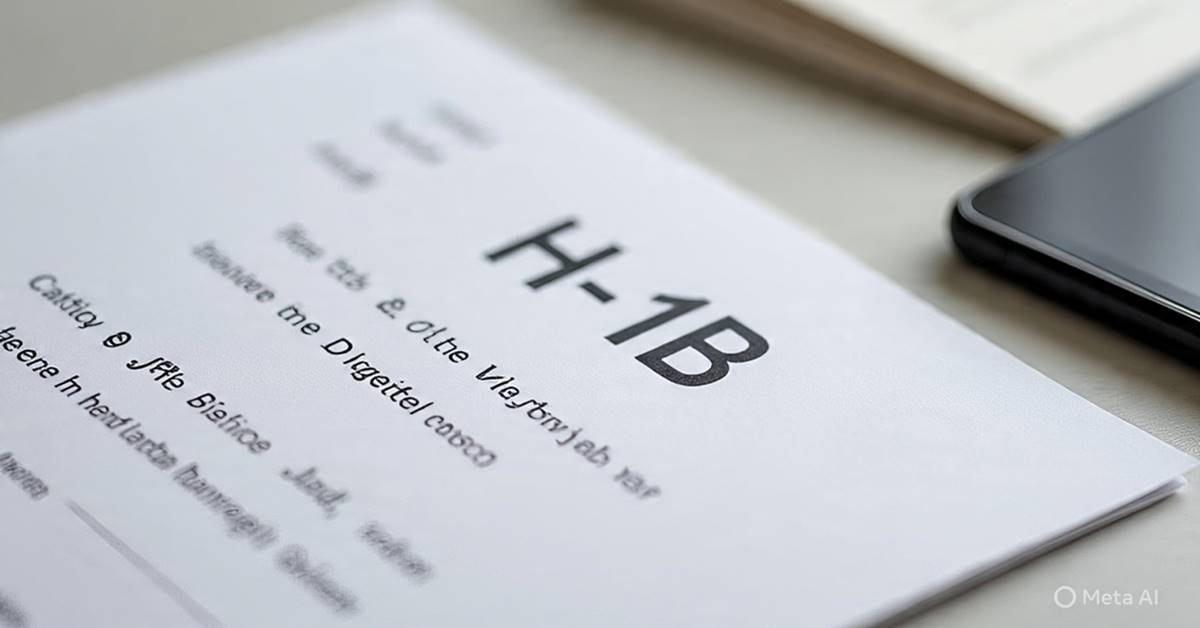The H-1B visa has long been the gateway to Silicon Valley for thousands of Indian engineers, developers, and tech professionals. However, the recent executive order by US President Donald Trump has dramatically changed the landscape. Under the new rule, every new H-1B application will attract a one-time fee of $100,000 (around ₹88 lakh).
This unprecedented move has sent shockwaves through the global tech industry, particularly in India, which accounts for nearly 70% of H-1B visa holders. While industry bodies and employees have expressed alarm, the surprising silence from Indian-origin CEOs leading major US tech companies has raised even more eyebrows.
The New H-1B Order: What It Means
| Aspect | Details |
|---|---|
| New Fee Structure | $100,000 (approx. ₹88 lakh) per new H-1B application |
| Affected Sectors | IT, software, healthcare, startups relying on global talent |
| Major Impact | Hiring slowdown, reduced global mobility, uncertainty for professionals |
| Key Concern | Heavy reliance on Indian engineers (approx. 70% of H-1B holders) |
Immediate Industry Reactions
- Tech Companies’ Response: Giants like Google, Microsoft, and Meta have moved quickly to pause overseas travel, reassess workforce planning, and issue guidelines to employees.
- Industry Body Concern: Nasscom, India’s IT industry representative, warned that the new rules would create “considerable uncertainty for businesses, professionals, and students across the world.”
- Employee Anxiety: Thousands of Indian tech aspirants see this as a major setback to their dreams of working in the US.
Where Are the Indian-Origin CEOs?
What makes this development even more intriguing is the deafening silence from Indian-origin leaders who now head some of the world’s most powerful tech companies:
- Sundar Pichai (Google)
- Satya Nadella (Microsoft)
- Shantanu Narayen (Adobe)
- Neal Mohan (YouTube)
- Jayshree Ullal (Arista Networks)
- Nikesh Arora (Palo Alto Networks)
Each of these leaders owes at least part of their journey to the H-1B system, yet none have made a public statement.
Why the Silence? Possible Explanations
- Corporate Responsibility Over Community Ties
CEOs may feel their first duty is to protect shareholder value, not engage in policy debates. Speaking out could risk straining relations with Washington. - Fear of Political Repercussions
Given Trump’s aggressive stance, public criticism could result in backlash against their companies in the form of investigations, scrutiny, or loss of contracts. - Shift in Identity
Some netizens argue that Indian-origin leaders have grown into American corporate figures first, distancing themselves from their roots. As one user bluntly put it: “They studied in India, availed facilities in India, and then moved to the USA on H-1B visas. Though Indian-origin, they now think like Americans.” - Calculated Silence
CEOs may prefer backchannel lobbying rather than public statements, influencing policy discreetly while avoiding media controversies.
Growing Criticism
The silence has not gone unnoticed:
- Shashi Tharoor, Indian MP, criticized the diaspora for not standing up during such critical issues. He lamented that influential Indian-origin leaders often avoid speaking out when their community faces uncertainty.
- Social media is abuzz with accusations that these CEOs are “docile, safe players” unwilling to risk their careers for broader causes.
- Others call them “American sepoys”, accusing them of seeing Indians through the lens of US corporate interests.
What This Means for Indian Tech Aspirants
- Higher Barriers to Entry: With $100,000 per application, startups and smaller firms may stop sponsoring H-1Bs, limiting opportunities to only big corporations.
- Shift in Destinations: Indian talent may now look towards Canada, Europe, or Singapore as alternatives.
- Humanitarian Impact: Families in mid-process for visas or waiting for green card transitions may face emotional and financial turmoil.
Honest Analysis
The new H-1B proclamation is a clear sign that immigration policy is being used as an economic tool. For India, it means reduced mobility for its brightest minds. For the US, it risks cutting off a crucial pipeline of skilled talent.
But the silence of diaspora CEOs is equally telling. Whether out of caution, corporate duty, or detachment, their refusal to speak openly has left a vacuum in leadership at a time when thousands of professionals are desperate for guidance.
In the end, the episode raises a bigger question: Should diaspora leaders advocate for their community, or are they bound only to their corporate responsibilities?
Disclaimer
General Disclaimer: This article is for informational purposes only. Immigration rules, policies, and government orders are subject to change. Readers are encouraged to consult official government sources before making decisions.
Opinion Disclaimer: The views expressed in this article reflect general analysis and online public discussions. They should not be taken as statements or positions of the companies or individuals mentioned.

